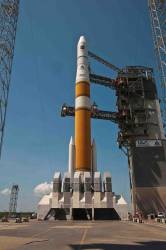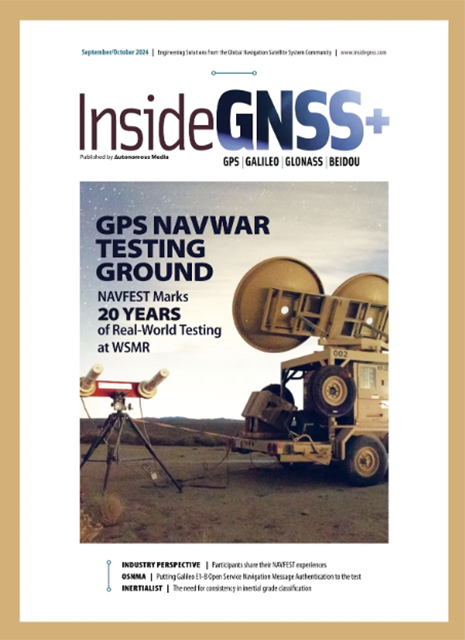The GPS program appears to be struggling on several fronts recently.
GPS III, the next-generation modernization project for the space and ground segments, is facing renewed uncertainty and possible schedule delays. At the same time, anticipated first launch of the follow-on block of satellites (Block IIF) with the new civil L5 signal has been postponed.
The GPS program appears to be struggling on several fronts recently.
GPS III, the next-generation modernization project for the space and ground segments, is facing renewed uncertainty and possible schedule delays. At the same time, anticipated first launch of the follow-on block of satellites (Block IIF) with the new civil L5 signal has been postponed.
The Air Force Acquisition Strategy Panel (ASP) will conduct a crucial meeting on June 7 to determine the new road map for GPS III. The Acquisition Strategy Panel is a panel of senior level acquisition personnel from offices of the Secretary of the Air Force for Acquisition (SAF/AQ), Air Force Materiel Command, and the user community, including Space & Missile Center (SMC) representation, that provides advice to program managers on their acquisition strategies.
Representatives of the NAVSTAR GPS Joint Program office, which is part of the SMC at Los Angeles AFB, told Inside GNSS that "pending results [from the ASP meeting] and approval of the acquisition strategy, a contract could be awarded as early as Dec 06/Jan 07." However, the JPO added, "the ASP may decide to have the program continue with payload risk reduction and system definition efforts."
This final observation reflects Air Force interest in keeping the GPS III satellites light and simple enough to keep costs down and possibly permit them to be launched two at a time, further reducing program costs. That was also the recommendation of a Defense Science Board Task Force on GPS report released earlier this year.
Should the ASP elect to recommend contract award, the RFP release would normally occur about five to six weeks after the panel’s decision, according to an SMC spokesperson. Contract award is then normally projected at seven months after the ASP decision.
If the contract is delayed for a substantial period of time, however, it will put pressure on the two competing GPS III consortia, led the Boeing Company and Lockheed Martin, to keep their engineering teams intact during the interim.
Meanwhile, the Air Force has increased its calculations for mean mission duration (or MMD, or projected lifespan) of the replenishment block satellites, including the modernized version with the new civil L2C and military M-code (Block IIR and IIR-M).
A longer MMD allows the Air Force to slow the rate at which it replaces satellites. For instance, the first Block IIR-M launch was in September 2005 and the next is not scheduled until next September.
Block IIF Difficulties. These developments are taking place at the same time that the U.S. Air Force is considering a plan to "truncate" the Block IIF buy at 12 satellites and introduce a phased GPS III technology development and acquisition plan.
That alternative calls for a GPS III contract in which the first set satellites would provide IIF-level capabilities that could be upgraded in later GPS III acquisition stages. It may also reflect unhappiness at what Air Force officials recently characterized as the "technical difficulties" encountered by IIF contractor Boeing that reportedly led to the launch delay from May 2007 to March 2008.
The continuing uncertainty in the GPS III program has not, however, dissuaded Lockheed Martin and EADS Astrium from announcing a teaming agreement to ensure interoperability of GPS III and the European GNSS, Galileo.
According to the agreement, the companies will perform systems engineering and technical assistance tasks for each other in the areas of interoperability, integrity and optimization of joint constellation performance. Additionally, the companies will offer reciprocal bids on operational hardware and software within the policy and export constraints of both programs.
A decision to award a single contract for modernized user equipment (MUE), the military handheld unit that will be able to process the M-code as well as legacy GPS signals, has also been delayed from its long-anticipated late-April decision deadline.
Failure to commit funds allocated for MUE by the end of March apparently led to the money being reprogrammed. However, according to Air Force and industry sources, the JPO is now looking at awarding three interim development contracts valued at about $7 million each in place of a single "down-select" award of about $11 million.
L3/Interstate Electronics, Rockwell Collins, and Raytheon are the three leading contenders for the contract and have been working under initial MUE contracts issued several years ago.
Copyright 2006 Gibbons Media and Research LLC





